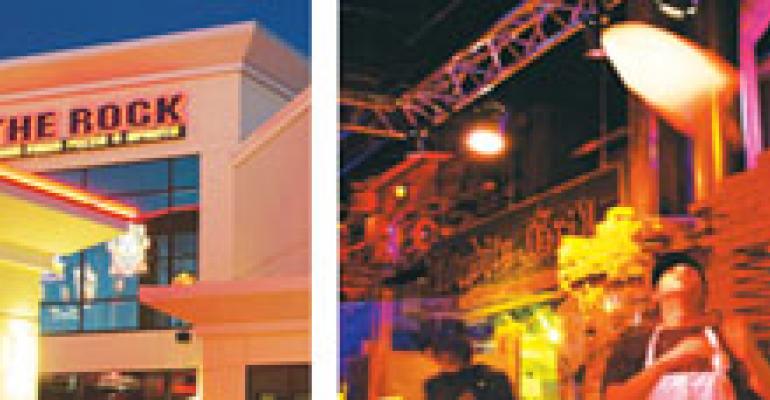While many operators in the recession-battered casual-dining segment are singing a sad, sad song, The Rock is rolling.
With 10 units open in the Pacific Northwest, construction under way for the first unit in Canada and an area-development deal in the works for Southern California, The Rock Wood-Fired Pizza & Spirits plans to spread its music-theme menu like a rock ’n’ roll earworm.
“The name comes from a love, passion and celebration of classic rock music,” said Kevin Hansen, president of the parent Keep Rockin’ LLC. “Our decor and theme really celebrate the classic-rock area—visually as well as audibly. We’re all about the pizza, but the design elements are the gritty, industrial theme.”
While casual dining is suffering in this recession, distinctive restaurants are finding an audience, said Steven Kamali, principal of Steven Kamali Hospitality Inc. of New York.
“Operators need to compartmentalize themselves within the casual-dining sector, finding a specific niche,” he said. “An effective, highly branded concept has become even more important than even service or food.”
The Rock serves a menu of gourmet pizzas, calzones, soups, salads, burgers, sandwiches, wraps and pasta. The per-person check average is about $21. The menu’s best sellers are named after classic-rock songs: the “Bad to the Bone” pizza features white cream sauce, mozzarella, Romano, pepperoni, peppered bacon, ham and red onions topped with peppercorn-ranch dressing, while the “Bohemian Rhapsody” has chicken, roasted peppers, cream sauce, mozzarella and Cajun spices.
The Rock’s special 900-degree ovens burn almond wood from Eastern Washington, imparting a smoky flavor to the pies.
The stores are open daily from 11:30 a.m. to midnight. An average unit covers 5,500 square feet and seats 250. The average unit volume is $2.6 million.
The first Rock opened in 1995 and “grew out of the partnership between a local businessman in Tacoma, Wash., and an enthusiastic, experienced pizza cook from Boston who came to Washington,” Hansen said. “They opened a pizza restaurant in Tacoma. It was a local iconic pizza restaurant originally called Rock Pasta that really became known for its hand-crafted wood-fired pizzas.”
The cook, Don Bellis, remains chief executive of Keep Rock-in’, and the business man, Jay Gigandet, is chief financial officer.
The partners developed a loyal following with the first unit, emphasizing a “Rocktail” menu with signature cocktails and microbrews. Alcohol accounts for about 30 percent of sales.
The founders own and operate seven locations in and around Seattle. The company has two franchised units in the Seattle area and one near Portland, Ore.
The Rock Wood-Fired Pizza & Spirits HEADQUARTERS: Auburn, Wash.MARKET SEGMENT: casual diningMENU: pizza, burgers, sandwiches and saladsNO. OF UNITS:10SYSTEMWIDE SALES: $26 millionLEADERSHIP: Don Bellis, chief executive and co-founder; Jay Gigandet, chief financial officer and co-founder; Kevin Hansen, president; Joe Menzyk, vice president of operations; and Brian Roach, director of marketingYEAR FOUNDED: 1995TARGET MARKETS: California, Colorado, Texas and CanadaTARGET DEMOGRAPHIC: 25-to-44-year-olds, skewing slightly maleMETHOD OF GROWTH/FUNDING: area-development franchisesNOTABLE COMPETITOR: BJ’s Restaurant & Brewhouse
The Rock has a five-unit development deal for areas around Portland and Vancouver, Wash.
Last year, it signed a 40-unit, 10-year development deal for Canada in a licensing agreement with Kaizen Foods. The first Canadian Rock unit will debut in Red Deer, Alberta. After landlord help, units generally cost about $1.3 million to $1.8 million to build out, Hansen said.
When it comes to site selection, The Rock generally looks at regional lifestyle centers “where you have a great mix of retail generators and national brands,” he said. “We also look at high-traffic, grocery-anchored community centers with a good national-brand mix of tenants.”
Chain executives are looking at markets that include San Diego, Denver, Dallas-Fort Worth, and Central and Northern California.
The franchise fee is $50,000, with a royalty of 4 percent of sales and an advertising contribution of 1 percent of net sales.
Consumers aged 25 to 44, skewing slightly more male, form the concept’s core demographic.
“Certainly we’re very, very popular with the fringe demographic of 18 to 24,” who like the social atmosphere, Hansen said. “It’s like warehouse-meets-rock-stage. It creates a vibe and social-party atmosphere in the restaurant. Today’s consumer wants something more than just a good pizza.”— [email protected]

